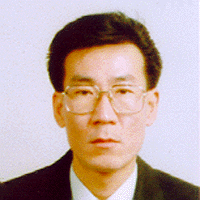Chung, Young-Bae Professor

| Career and thesis | |
|---|---|
| Education | Ph D in medical school of Chung-Ang Univ. |
| Major career | Teaching assistant of Chung-Ang Univ. medical school.
Post-doctoral fellow of Seoul National University College of Medicine. |
| main paper | 1. Lee J, Kim S, Kim M, Chung YB, Huh JS, Park CM, Lee KH, Kim JH. (2008) Anaphylaxis to husband's seminal plasma and treatment by local desensitization. Clin Mol Allergy 6:13
2. Chung YB and Yang HJ (2008) Partial purification and characterization of a cysteine protease inhibitor from the plerocercoid of Spirometra erinacei. Korean Journal of Parasitology, 46(3): 183-186. 3. Chung YB, Kita H, Shin MH (2008) A 27 kDa cysteine protease secreted by newly excysted Paragonimus westermani metacercariae induces superoxide anion production and degranulation of human eosinophils. Korean Journal of Parasitology, 46(2): 95-99. |

| Career and thesis | |
|---|---|
| Education | |
| Major career | |
| main paper | 1. Lee YA, Shin MH. Dynamin 2-mediated endocytosis of BLT1 is required for IL-8 production in HMC-1 cells induced by Trichomonas vaginalis-derived secretory products. Parasites Hosts Dis. 2024 Aug;62(3):281-293.
2. Lee YA, Shin MH.CysLT receptor-mediated NOX2 activation is required for IL-8 production in HMC-1 cells induced by Trichomonas vaginalis-derived secretory products. Parasites Hosts Dis. 2024 Aug;62(3):270-280. 3. Kang D, Choi JH, Kim M, Yun S, Oh S, Yi MH, Yong TS, Lee YA, Shin MH, Kim JY. Optimization of 18S rRNA metabarcoding for the simultaneous diagnosis of intestinal parasites. Sci Rep. 2024 Oct 23;14(1):25049. 4. Lee YA, Shin MH. Involvement of NOX2-derived ROS in human hepatoma HepG2 cell death induced by Entamoeba histolytica. Parasites Hosts Dis. 2023 Nov;61(4):388-396. 5. Lee YA, Sim S, Kim KA, Shin MH. Signaling Role of NADPH Oxidases in ROS-Dependent Host Cell Death Induced by Pathogenic Entamoeba histolytica. Korean J Parasitol. 2022 Jun;60(3):155-161. 6. Lee YA, Kim KA, Shin MH. Naegleria fowleri Induces Jurkat T Cell Death via O-deGlcNAcylation. Korean J Parasitol. 2021 Oct;59(5):501-505. 7. Lee YA, Nam YH, Min A, Shin MH. Trichomonas vaginalis-secreted cysteinyl leukotrienes promote migration, degranulation and MCP-1 production in mast cells. Parasite Immunol. 2020 Dec;42(12):e12789. 8. Lee YA, Kim KA, Min A, Shin MH. NOX4 activation is involved in ROS-dependent Jurkat T-cell death induced by Entamoeba histolytica. Parasite Immunol. 2019 Nov;41(11):e12670. 9. Lee YA, Min A, Shin MH. O-deGlcNAcylation is required for Entamoeba histolytica-induced HepG2 cell death. Microb Pathog. 2018 Oct;123:285-295. 10. Min A, Lee YA, Kim KA, Shin MH. BLT1-mediated O-GlcNAcylation is required for NOX2-dependent migration, exocytotic degranulation and IL-8 release of human mast cell induced by Trichomonas vaginalis-secreted LTB(4). Microbes Infect. 2018 Jun-Jul;20(6):376-384. 11. Ahn CS, Kim JG, Shin MH, Lee YA, Kong Y.Comparison of Secretome Profile of Pathogenic and Non-Pathogenic Entamoeba histolytica. Proteomics. 2018 Apr;18(7):e1700341. |












 예비대학생
예비대학생 재학생
재학생 졸업생
졸업생 일반인
일반인 교직원
교직원